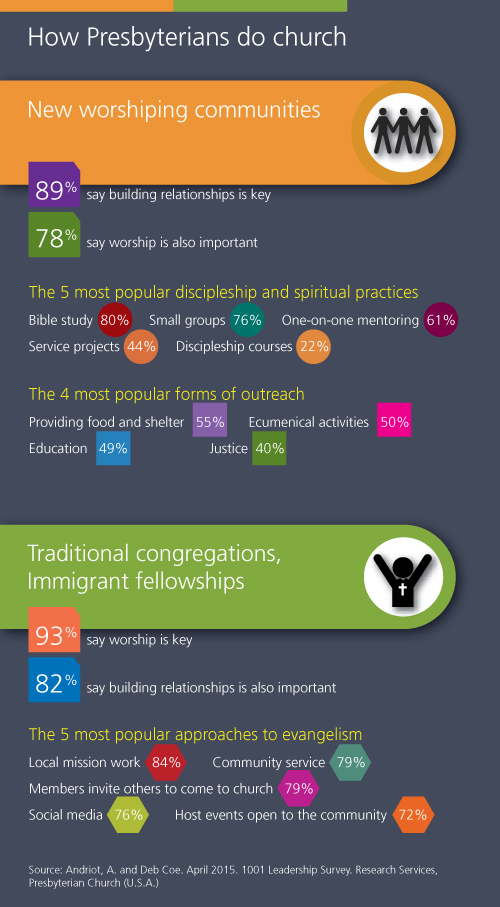GO FIGURE
by Angie Andriot | Research associate with Research Services for the Presbyterian Mission Agency
 New worshiping communities are all about relationships. A recent study by Research Services found that leaders of new worshiping communities rate building relationships as the most important activity for their community, whereas immigrant fellowships, traditional new church developments, and traditional congregations rate worship as most important.
New worshiping communities are all about relationships. A recent study by Research Services found that leaders of new worshiping communities rate building relationships as the most important activity for their community, whereas immigrant fellowships, traditional new church developments, and traditional congregations rate worship as most important.
This is not to say that new worshiping communities lack a focus on God; rather, people in new worshiping communities tend to find, experience, and share God through their network of relationships. These leaders tend to favor the use of small groups and individual interactions; the most common methods of discipleship include Bible study, small groups, and one-on-one mentoring.
This difference between new worshiping communities and more traditional congregations is most evident in evangelism. Traditional congregations are more likely to use the “invite others to church” approach. The problem is, traditional pastors don’t generally feel their congregation’s evangelism efforts are working for them very well.
Although both types of communities see local mission work and community service as forms of evangelism, for many traditional congregations, those may be the only forms of evangelism that they use.
New worshiping communities, on the other hand, are much more likely to use testimonial and relational forms of evangelism, in addition to going out into the community and serving. Essentially, for new worshiping communities, the network of relationships is everything.
![]() You may freely reuse and distribute this article in its entirety for non-commercial purposes in any medium. Please include author attribution, photography credits, and a link to the original article. This work is licensed under a Creative Commons Attribution-NonCommercial-NoDeratives 4.0 International License.
You may freely reuse and distribute this article in its entirety for non-commercial purposes in any medium. Please include author attribution, photography credits, and a link to the original article. This work is licensed under a Creative Commons Attribution-NonCommercial-NoDeratives 4.0 International License.
Categories: Presbyterians Today
Tags: evangelism, network, networking, new worshiping communities, relationships, research
Ministries: Presbyterians Today, Research Services